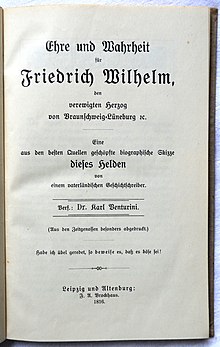Karl Heinrich Georg Venturini
Karl Heinrich Georg Venturini (born January 30, 1768 in Braunschweig , † May 25, 1849 in Schöppenstedt ) was a German theologian and very productive author of theological and historical works.
life and work

Karl Venturini's family was probably of Italian origin on his father's side. His father, also named Karl (1735–1801), was a chamber musician at the ducal court in Braunschweig . Karl's sister Caroline Auguste (* 1764; † 1822 or 1842) was a well-known writer of the 19th century.
From 1788 studied Venturini at Heinrich Philipp Konrad Henke theology at the University of Helmstedt , where he in 1794 received his doctorate . Between 1797 and 1799 Venturini taught at the boys' school of his brother-in-law Christoph Johann Rudolph Christiani (1761–1841) in Copenhagen , the first husband of his sister Caroline. During this time he first appeared in the public eye as the author of enlightening theological writings on the life of Jesus research , which, however, vehemently criticized his theses .
In 1807 Venturini was appointed to the pastorate of Hordorf near Braunschweig, which he held until 1844. During this time he wrote numerous and extensive works on theological as well as historical topics. Venturini was one of the representatives of theological rationalism . He continued the "Chronicle of the 19th Century" begun by the Helmstedt history professor Gabriel Gottfried Bredow (1773-1814) for the years 1807-1841.
His best-known local and regional works include the four-volume handbook of patriotic history for all residents of Braunschweig-Lüneburg , which was published from 1805 to 1809, as well as The Duchy of Braunschweig in its current state , from 1826, which was reprinted in 1829 and 1846.
With his handbook of patriotic history for all classes of Braunschweig-Lüneburg residents , Venturini broke new ground in describing the history of the Duchy of Braunschweig . In the spirit of the Enlightenment , he was the first to write a true "folk and cultural history", as the history of the country had previously been understood and reproduced exclusively as the "princely history". The “common people” only played an extra role ; Otherwise the life of the nobility , clergy and townspeople was depicted . Venturini had originally intended to give his book the title “The Sassen and their Descendants in the Braunschweig-Lüneburg Lands” , but finally chose the other. The handbook reflected the state of research of its time and was in many respects groundbreaking for the subsequent regional historical literature.
Works (selection)
- Erich Stenbock and his friends, a Swedish story from the last half of the sixteenth century. 1828.
- The first great fight for Germany's freedom under Hermann the Cheruscan. 1821-1822.
- Handbook of patriotic history for all residents of Braunschweig-Lüneburg. Braunschweig 1805–1809.
- Hermann der Sassen Herzog, Germany's avenger and liberator. A romantic picture of old German freedom and national greatness. 1804-1805.
- The Duchy of Brunswick in its present state. Helmstedt 1826 ( digitized version of the 2nd edition Helmstedt 1829 ).
- Jean Cavalier or Louis XIV in battle with his Protestant subjects in Languedoc. A story from the first years of the eighteenth century. 1831.
- Jesus the risen. 1802.
- Muhammed Abul Casem, the great prophet of Mecca. A side piece to the natural history of the great teacher of Nazareth. Vol. 1-2 Mecca (Copenhagen) 1802-3.2. Ed. UdT: Islam and its founder Abul Casem Muhamed. With special reference to the latest events in Greece, historically dramatic. 1822.
- Compulsory monastery and flight from the monastery or the life of the Capuchin monk JF Hasse. 1806.
- Scandinavia and Carl XIV. Johann. Nordic memorabilia from old and new times. Braunschweig 1821.
literature
- Horst-Rüdiger Jarck , Gerhard Schildt (Hrsg.): Braunschweigische Landesgeschichte. A region looking back over the millennia. Appelhans, Braunschweig 2000, ISBN 3-930292-28-9 .
- Horst-Rüdiger Jarck , Günter Scheel (Ed.): Braunschweigisches Biographisches Lexikon - 19th and 20th centuries . Hahnsche Buchhandlung, Hannover 1996, ISBN 3-7752-5838-8 .
Individual evidence
- ↑ Horst-Rüdiger Jarck, Günter Scheel (ed.): Braunschweigisches Biographisches Lexikon. 19th and 20th centuries. P. 178.
- ↑ Horst-Rüdiger Jarck, Günter Scheel (ed.): Braunschweigisches Biographisches Lexikon. 19th and 20th centuries. P. 628.
- ↑ Horst-Rüdiger Jarck, Gerhard Schildt (Ed.): Braunschweigische Landesgeschichte. A region looking back over the millennia. P. 74f.
Web links
| personal data | |
|---|---|
| SURNAME | Venturini, Karl Heinrich Georg |
| ALTERNATIVE NAMES | Venturini, Karl |
| BRIEF DESCRIPTION | German theologian and writer |
| DATE OF BIRTH | January 30, 1768 |
| PLACE OF BIRTH | Braunschweig |
| DATE OF DEATH | May 25, 1849 |
| Place of death | Schöppenstedt |
